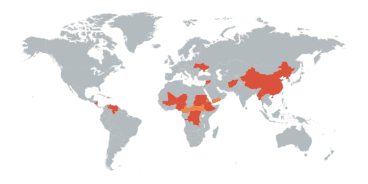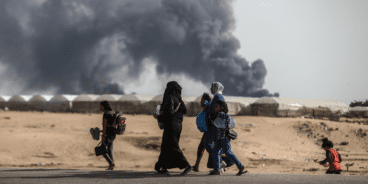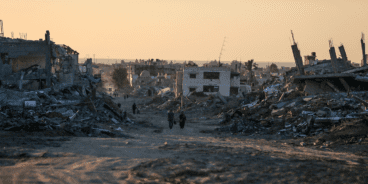
Atrocity Alert No. 102: Yemen and South Sudan
Atrocity Alert is a weekly publication by the Global Centre for the Responsibility to Protect highlighting situations where populations are at risk of, or are enduring, mass atrocity crimes.
Airstrikes and atrocities continue in Yemen
On Sunday, 22 April, an airstrike on a wedding party in northwestern Yemen killed at least 21 people, including children. Two days earlier at least 20 civilians were killed in another airstrike on a vehicle in Taizz governorate. It is suspected that both airstrikes were carried out by the Saudi Arabia and United Arab Emirates (UAE)-led military coalition that is battling Houthi rebels who still control much of Yemen, including the capital, Sana’a.
The Saudi/UAE-led coalition intervened in the conflict between Houthi rebels and pro-government forces in March 2015. At least 5,790 Yemeni civilians have been killed since then and all parties to the conflict have targeted civilian infrastructure, including schools and healthcare facilities. Such attacks may constitute war crimes.
On Saturday, 21 April, unknown armed men also attacked an International Committee of the Red Cross vehicle in Taizz governorate, killing aid worker Hanna Lahoud. The targeting of humanitarian personnel is also violation of international law and may amount to a war crime.
The UN Secretary-General, António Guterres, condemned the murder of Mr. Lahoud as well as recent deadly airstrikes on civilians, and has called for an investigation.
The war in Yemen has lasted more than three years and created the worst humanitarian crisis in the world. An estimated 22.2 million people – more than three quarters of Yemen’s population – require humanitarian assistance, including 8.4 million at risk of famine. Nevertheless, peace talks have been stalled since 2016.
In his first briefing to the UN Security Council (UNSC) on 17 April the new UN Special Envoy for Yemen, Martin Griffiths, told the Council he would put forward a framework for negotiations within two months. The UNSC must actively support Griffiths and help facilitate a sustained ceasefire as well as a return to substantive peace talks. The UNSC must also demand that all parties to the conflict cease attacks on civilians and ensure accountability for atrocities.
All UN member states should immediately halt the sale of weapons to parties to the conflict in Yemen who routinely violate International Humanitarian Law, including Saudi Arabia and the UAE.
Children bear the brunt of conflict in South Sudan
On 17 April at least 207 child soldiers – 112 boys and 95 girls – were released in South Sudan’s Western Equatoria State. This was the third major release of child soldiers so far this year and followed the liberation of 311 children during March. According to the UN Children’s Fund, more than 19,000 children have been recruited by parties to the conflict since the outbreak of civil war in December 2013.
A new report from Watchlist on Children and Armed Conflict states that access to healthcare and food aid has also dropped dramatically for hundreds of thousands of children due to the deliberate denial of humanitarian access and attacks on health facilities. According to the UN Office for the Coordination of Humanitarian Affairs, more than 1.7 million children under five years old and pregnant and lactating women suffer from acute malnutrition. Between January 2016 and December 2017 parties to the conflict carried out at least 50 attacks on medical facilities and health workers. Of South Sudan’s estimated 1900 health facilities, only about 400 are still fully operational.
The 12 April report of the UN Panel of Experts on South Sudan confirmed that both government forces and armed opposition groups continue to obstruct or deny humanitarian access to vulnerable populations in several parts of the country. The Panel concluded that the situation will continue to deteriorate due to the ongoing failure of South Sudan’s leaders to uphold their political obligations. Last week the third round of the High-Level Revitalization Forum (HLRF), launched in an attempt to reinvigorate the 2015 Peace Agreement, was indefinitely postponed.
The recruitment of child soldiers, attacks on healthcare and the deliberate denial of humanitarian assistance amount to war crimes. All parties to the conflict in South Sudan should immediately grant unimpeded humanitarian access to vulnerable civilians, and both the government and opposition should meaningfully commit to the HLRF. The African Union and UN Security Council must hold all perpetrators of atrocities and spoilers of the 2015 Peace Agreement accountable, regardless of their position or affiliation.

